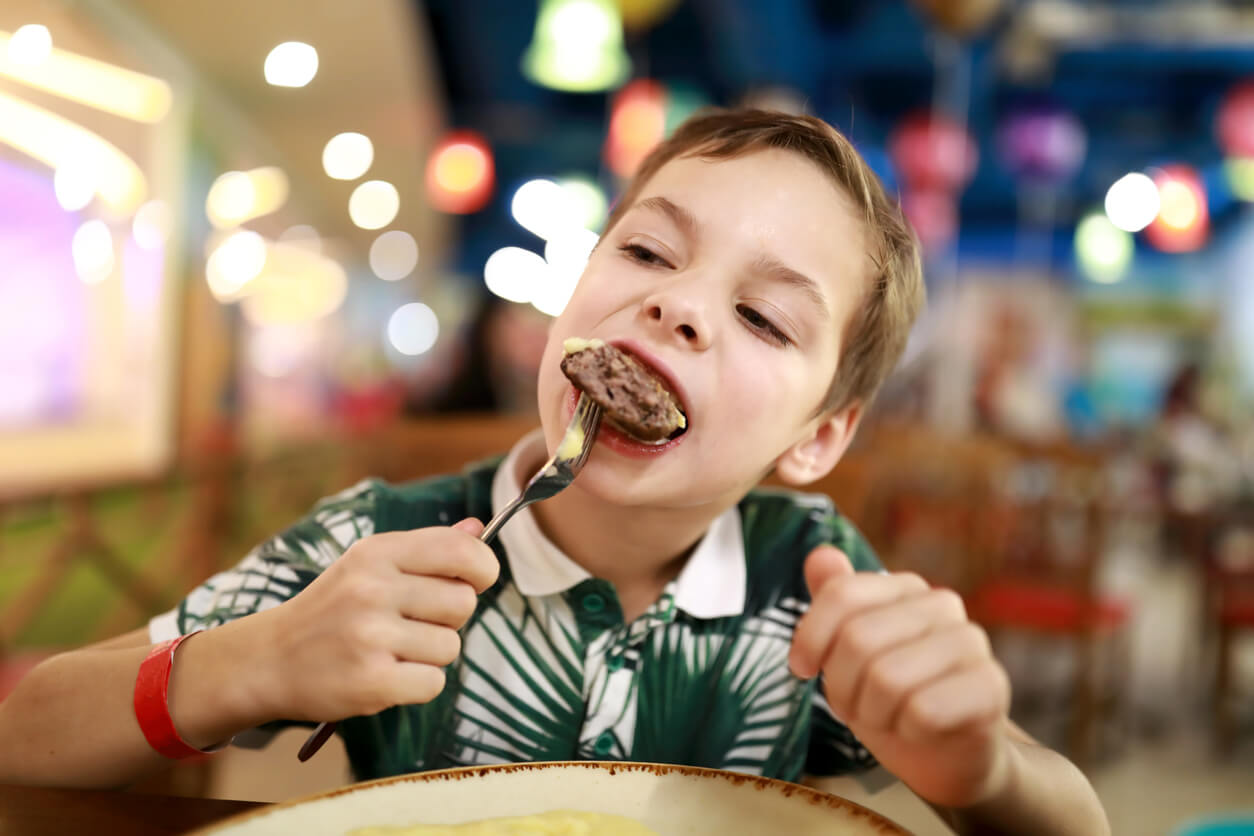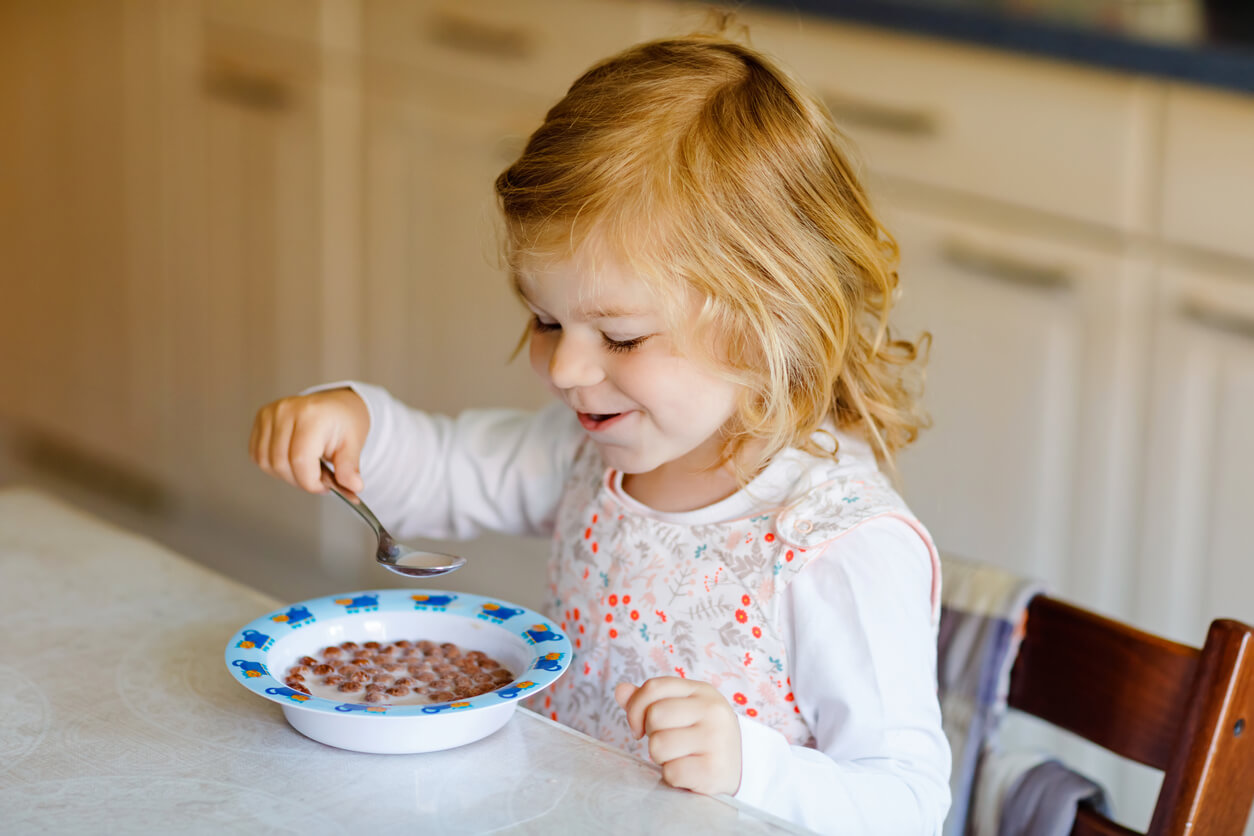6 Iron-Rich Foods for Babies and Children


Written and verified by the nutritionist Saúl Sánchez Arias
It’s essential to know which foods are rich in iron so that you can include them in your family’s diet. This nutrient is essential for the human body and a deficit of the mineral can generate anemia which implies an inefficient supply of oxygen to the cells, which is followed by chronic fatigue. Therefore, we want to tell you about 6 iron-rich foods for babies and children.
First, you should note that dietary iron is generally poorly absorbed. This means that a regular intake is necessary to avoid deficiencies. Even in the context of a proper diet, you may face a case of anemia that has to be corrected by administering the mineral intravenously.
Iron-rich foods for infants and children
Here are the best iron-rich foods for infants and children so you can make sure that they’re part of their diet on a regular basis.
1. Beef
Beef has one of the best types of iron that exists, heme iron. It’s present in almost all foods of animal origin. Although its absorption rate is much higher than that of iron present in vegetables, it’s still less than 20% in the best of cases.
As a general rule, it’s always best to consume foods with a high iron content together with others with a high vitamin C concentration. This last element is capable of enhancing the intestinal absorption of the mineral, according to a study published in the journal JAMA.

2. Pork liver
Viscera are characterized by being products with high nutritional density. Normally, they’re usually given to children with micronutrient deficiencies to try to correct these problems. However, their organoleptic characteristics aren’t pleasing to everyone, which can be a conditioning factor when including them in the diet.
3. Mussels
Most marine products also contain significant doses of heme iron. Among them, mussels and clams stand out. These can be included in the diet of children on a regular basis to improve blood levels of the mineral. However, beware of allergies and bacterial contamination.
4. Eggs
For many years, the weekly intake of eggs was limited due to the supposed influence of these foods on cholesterol levels. Nowadays, it has been demonstrated that their consumption doesn’t negatively affect the lipid profile, nor does it present a risk of developing cardiovascular diseases. This is evidenced by research published in the journal Nutrients.
It should also be noted that eggs are nutritionally dense foods. They provide proteins of high biological value, healthy fats, vitamin D, and other essential elements to guarantee a good state of health in the medium term.
5. Cereals
It’s common for commercial cereals to be fortified with essential micronutrients, such as iron. However, it’s important to carefully observe the labeling before offering these products to children and infants. Take into account that it’s common for them to contain excessive amounts of simple sugars, which worsens their nutritional value.

6. Oatmeal
Oatmeal is one of the best cereals available. It has a significant amount of high-quality fiber. In addition, it’s among the iron-rich foods for babies and children, so it can be introduced into the diet of little ones to avoid deficits of this nutrient. The good news is that its inclusion is really simple.
Ensure the supply of iron-rich foods in the diet of children and infants
As you’ve seen, it’s crucial to include iron-rich foods for babies and children. This prevents the development of anemia, a complex disease that causes an altered sense of vitality. In addition, its resolution can be extended in time if the mineral isn’t applied intravenously.
However, it should be noted that iron-rich foods for babies and children should be consumed with products that contain vitamin C in order to enhance the absorption of this element. Otherwise, most of it could be excreted through the feces.
It’s essential to know which foods are rich in iron so that you can include them in your family’s diet. This nutrient is essential for the human body and a deficit of the mineral can generate anemia which implies an inefficient supply of oxygen to the cells, which is followed by chronic fatigue. Therefore, we want to tell you about 6 iron-rich foods for babies and children.
First, you should note that dietary iron is generally poorly absorbed. This means that a regular intake is necessary to avoid deficiencies. Even in the context of a proper diet, you may face a case of anemia that has to be corrected by administering the mineral intravenously.
Iron-rich foods for infants and children
Here are the best iron-rich foods for infants and children so you can make sure that they’re part of their diet on a regular basis.
1. Beef
Beef has one of the best types of iron that exists, heme iron. It’s present in almost all foods of animal origin. Although its absorption rate is much higher than that of iron present in vegetables, it’s still less than 20% in the best of cases.
As a general rule, it’s always best to consume foods with a high iron content together with others with a high vitamin C concentration. This last element is capable of enhancing the intestinal absorption of the mineral, according to a study published in the journal JAMA.

2. Pork liver
Viscera are characterized by being products with high nutritional density. Normally, they’re usually given to children with micronutrient deficiencies to try to correct these problems. However, their organoleptic characteristics aren’t pleasing to everyone, which can be a conditioning factor when including them in the diet.
3. Mussels
Most marine products also contain significant doses of heme iron. Among them, mussels and clams stand out. These can be included in the diet of children on a regular basis to improve blood levels of the mineral. However, beware of allergies and bacterial contamination.
4. Eggs
For many years, the weekly intake of eggs was limited due to the supposed influence of these foods on cholesterol levels. Nowadays, it has been demonstrated that their consumption doesn’t negatively affect the lipid profile, nor does it present a risk of developing cardiovascular diseases. This is evidenced by research published in the journal Nutrients.
It should also be noted that eggs are nutritionally dense foods. They provide proteins of high biological value, healthy fats, vitamin D, and other essential elements to guarantee a good state of health in the medium term.
5. Cereals
It’s common for commercial cereals to be fortified with essential micronutrients, such as iron. However, it’s important to carefully observe the labeling before offering these products to children and infants. Take into account that it’s common for them to contain excessive amounts of simple sugars, which worsens their nutritional value.

6. Oatmeal
Oatmeal is one of the best cereals available. It has a significant amount of high-quality fiber. In addition, it’s among the iron-rich foods for babies and children, so it can be introduced into the diet of little ones to avoid deficits of this nutrient. The good news is that its inclusion is really simple.
Ensure the supply of iron-rich foods in the diet of children and infants
As you’ve seen, it’s crucial to include iron-rich foods for babies and children. This prevents the development of anemia, a complex disease that causes an altered sense of vitality. In addition, its resolution can be extended in time if the mineral isn’t applied intravenously.
However, it should be noted that iron-rich foods for babies and children should be consumed with products that contain vitamin C in order to enhance the absorption of this element. Otherwise, most of it could be excreted through the feces.
All cited sources were thoroughly reviewed by our team to ensure their quality, reliability, currency, and validity. The bibliography of this article was considered reliable and of academic or scientific accuracy.
- Li, N., Zhao, G., Wu, W., Zhang, M., Liu, W., Chen, Q., & Wang, X. (2020). The Efficacy and Safety of Vitamin C for Iron Supplementation in Adult Patients With Iron Deficiency Anemia: A Randomized Clinical Trial. JAMA network open, 3(11), e2023644. https://doi.org/10.1001/jamanetworkopen.2020.23644
- Blesso, C. N., & Fernandez, M. L. (2018). Dietary Cholesterol, Serum Lipids, and Heart Disease: Are Eggs Working for or Against You?. Nutrients, 10(4), 426. https://doi.org/10.3390/nu10040426
This text is provided for informational purposes only and does not replace consultation with a professional. If in doubt, consult your specialist.








